Best MATLAB Learning Tools to Buy in February 2026
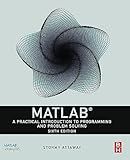
MATLAB: A Practical Introduction to Programming and Problem Solving


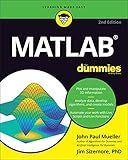
MATLAB For Dummies (For Dummies (Computer/Tech))


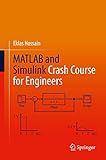
MATLAB and Simulink Crash Course for Engineers


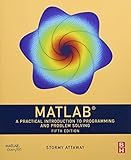
MATLAB: A Practical Introduction to Programming and Problem Solving



MATLAB with Python



MATLAB Fundamentals for Engineers


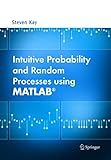
Intuitive Probability and Random Processes using MATLAB



MATLAB for Machine Learning: Unlock the power of deep learning for swift and enhanced results


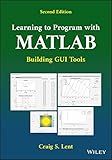
Learning to Program with MATLAB: Building GUI Tools


To perform matrix multiplication in MATLAB, you can use the built-in function * or the mtimes() function. Here's a simple explanation of how to perform matrix multiplication in MATLAB:
- Define the matrices you want to multiply. For example, let's say you have matrix A with dimensions m x n and matrix B with dimensions n x p.
- Use the * operator or the mtimes() function to perform the matrix multiplication. The result will be a new matrix C with dimensions m x p. MATLAB automatically handles the dimensionality of the matrices during multiplication.
Here's an example code snippet that demonstrates matrix multiplication in MATLAB:
% Define the matrices A and B A = [1, 2; 3, 4]; B = [5, 6; 7, 8];
% Perform matrix multiplication C = A * B; % Alternatively, you can use C = mtimes(A, B);
% Display the result disp(C);
In this example, matrix A is a 2x2 matrix, matrix B is a 2x2 matrix, and the result matrix C will be a 2x2 matrix. The output will be:
19 22 43 50
Make sure the dimensions of the matrices are compatible for multiplication. The number of columns in matrix A must be equal to the number of rows in matrix B in order to perform matrix multiplication.
How to perform matrix multiplication using element-wise operations in MATLAB?
To perform matrix multiplication using element-wise operations in MATLAB, you can use the dot product function .*. Here is a step-by-step procedure:
- Create two matrices, A and B, with compatible dimensions for element-wise multiplication. For example:
A = [1, 2, 3; 4, 5, 6]; B = [7, 8, 9; 10, 11, 12];
- Use the dot product operator .* to perform element-wise multiplication between the corresponding elements of A and B. Assign the resulting matrix to C:
C = A .* B;
- The resulting matrix C will have the same dimensions as A and B, and its elements will be the element-wise products of the corresponding elements from A and B. For example, if you print C to the command window:
disp(C);
You will get the following output:
7 16 27
40 55 72
What is the fastest way to perform matrix multiplication in MATLAB?
There are several ways to optimize matrix multiplication in MATLAB for faster performance:
- Use the built-in matrix multiplication operator (*): The * operator in MATLAB is optimized for matrix multiplication and is generally faster than using element-wise multiplication (.*). For example, instead of using A .* B, use A * B to perform matrix multiplication.
- Utilize MATLAB's parallel computing capabilities: If you have a multicore processor, you can take advantage of MATLAB's parallel computing features to distribute the workload across multiple cores. You can use the parfor loop instead of the regular for loop to parallelize the matrix multiplication.
- Use the bsxfun function for element-wise matrix operations: bsxfun is optimized for element-wise operations. If you need to perform element-wise multiplication, division, or other operations, using bsxfun can be faster than other methods. For example, bsxfun(@times, A, B) performs element-wise multiplication between matrices A and B.
- Leverage MATLAB's built-in matrix multiplication functions: MATLAB provides various functions optimized for matrix multiplication, such as mtimesx, mex, and mtimes. These functions are generally faster than using the regular * operator. You can check the MATLAB documentation for more information on these functions.
- Use compiled MATLAB code: If performance is critical, you can convert your MATLAB code to a compiled executable using MATLAB's mcc compiler. This compilation process can provide significant speed improvements compared to running the code in the MATLAB interpreter.
- Optimize memory usage: Matrix multiplication can be memory-intensive, so try to reduce memory usage when possible. This includes avoiding unnecessary copies of matrices, reusing variables, and using sparse matrices if appropriate.
It's worth noting that the performance improvement may vary depending on the size of matrices, hardware, and specific operations performed. It is recommended to test and compare different approaches and choose the one that provides the best performance for your specific use case.
What is the associative property of matrix multiplication?
The associative property of matrix multiplication states that the order of matrix multiplication can be changed without affecting the result.
Mathematically, for three matrices A, B, and C, if the product (AB)C is defined, then it is equal to A(BC). In other words, (AB)C = A(BC).
This property allows for the grouping of matrix multiplications, and enables more efficient computations in practice.
What is the role of matrix multiplication in solving systems of linear equations?
Matrix multiplication plays a crucial role in solving systems of linear equations. A linear system can be represented in matrix form as AX = B, where A is a coefficient matrix, X represents the unknown variables, and B represents the constant terms.
To solve this system, we can employ matrix multiplication. The key idea is to isolate the X matrix on one side of the equation. Multiplying both sides of the equation by the inverse of matrix A, if it exists, yields:
(A^-1)(AX) = (A^-1)B,
resulting in:
(I)(X) = (A^-1)B,
where I is the identity matrix. Since the product of the identity matrix and any matrix is that matrix itself, we have:
X = (A^-1)B.
This demonstrates that the solution for the unknown variables X can be found by multiplying the inverse of the coefficient matrix A with the constant matrix B.
However, it is important to note that a solution exists only if the inverse of matrix A exists. In cases where the inverse does not exist, the system of linear equations is either inconsistent or dependent.
How to multiply a matrix with a vector in MATLAB?
To multiply a matrix with a vector in MATLAB, you can use the "* "operator or the "mtimes" function. Here is an example:
% Define a matrix A = [1, 2, 3; 4, 5, 6; 7, 8, 9];
% Define a vector B = [2; 3; 4];
% Multiply matrix A with vector B using the "*" operator result1 = A * B;
% Multiply matrix A with vector B using the "mtimes" function result2 = mtimes(A, B);
The result will be a new vector that represents the multiplication of the matrix with the vector.
How to perform matrix multiplication using the cross operator in MATLAB?
In MATLAB, you can perform matrix multiplication using the cross product operator *. However, the standard cross product operator is used for vector cross product and is not suitable for matrix multiplication. To perform matrix multiplication, you can use the * operator directly.
Here is an example of performing matrix multiplication using the * operator in MATLAB:
% Define two matrices A = [1, 2, 3; 4, 5, 6]; % 2x3 matrix B = [7, 8, 9; 10, 11, 12]; % 2x3 matrix
% Perform matrix multiplication C = A * B;
% Display the result disp(C);
Output:
57 66 75 138 162 186
In the above example, A and B are both 2x3 matrices. When we perform the matrix multiplication C = A * B, MATLAB performs the appropriate matrix multiplication and assigns the result to C.
